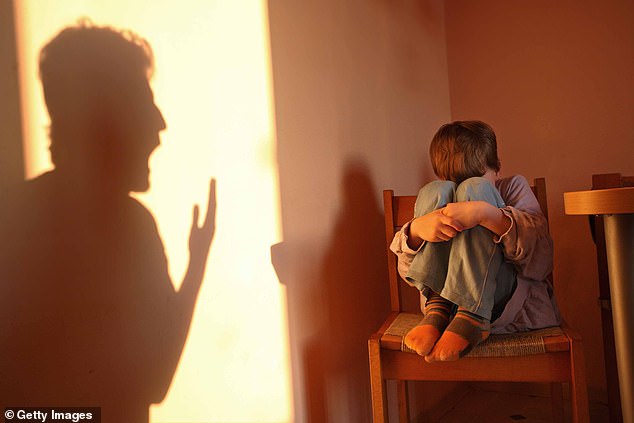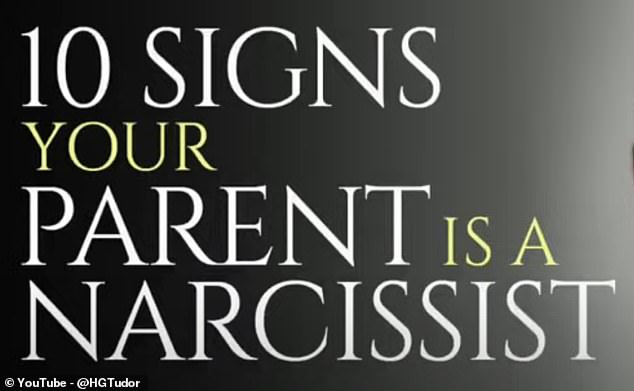A diagnosed narcissist has shared the signs that you grew up with a narcissistic parent.
HG Tudor, who discusses his diagnosis of narcissism on his YouTube page, noted that narcissists “show up in a lot of different places,” such as social situations or at work.
“There are two areas in which the presence of a narcissist causes the most damage: in a romantic entanglement and in a family one.”
‘Those who have one or more narcissistic parents had no choice in the matter.
) They were brought into a home where a narcissist existed, and have been subjected to that throughout their childhood and into adulthood.
According to HG Tudor, people don’t realize (or suspect) until they are adults that their parents may be narcissistic. He noted that it is “uncommon” for a child to come to that conclusion.
He noted that being in a romantic relationship with a narcissist can make people realize that their parents are one too.
Another way people come to this conclusion is by analyzing their own behaviors, which, he noted, “have arisen from the abuse that you have suffered, that you see the way you react in certain circumstances,” and perhaps by seeking therapy you discover that you have been exposed to a narcissistic parent.
According to the American Psychological Association: ‘Narcissistic personality disorder (NPD) is the group of cluster B disorders that also includes antisocial, histrionic, and borderline. NPD involves three elements: an inflated view of oneself, a lack of warmth or empathy in relationships, and the use of a variety of strategies to maintain the inflated view of oneself.
While NPD is a disorder, people can also have narcissistic traits without having the disorder.
1. You are expected to be the caregiver
According to HG Tudor, the role of parents is to “protect the child from the vagaries of life, guide them, provide emotional support, not only, of course, provide shelter, warmth, food and drink, but also provide guidance through life.” .
Most parents, when faced with difficulties, he added, “will accept the problem themselves and solve it,” since children are not prepared to deal with adult problems.
However, he said, when dealing with a narcissistic parent, “you, as a child, may well become the emotional rock for the narcissist who complains about the behaviors of others,” particularly a spouse or other family members. .
Additionally, children of narcissistic parents can be expected to perform other tasks, including housework and caring for their parents, physically or financially. In other words, “you end up having to be the father’s father.”
2. Boundaries are repeatedly crossed
Narcissistic parents overstep their children’s boundaries, according to HG Tudor, choosing their friends, prohibiting them from spending time with some people, and generally interfering in other aspects of their lives.
Furthermore, he said: “If you try to fight this interference, you may very well encounter the ignition of fury.”
HG Tudor is a content creator who claims to have narcissistic personality disorder and shares information about this condition.
3. You are used to validating them
The third point raised by HG Tudor was that narcissistic parents use their children to validate them.
Speaking in the video, he said: “They seek your agreement, even when you don’t actually agree with their behaviours.” They must have your approval for this. They may gossip about other people, criticize them and expect you to agree with their position.’
He added that they “repeatedly seek validation for their behaviors by receiving your approval; a parent should move on.”
A narcissistic parent may also seek validation by “flaunting a child’s accomplishments (…) the fueled responses provide validation that he or she is a good, bright, and talented parent.”
He added that healthy parents do not seek this validation from outside sources.
4. The use of favorites
Narcissistic parents use favorites, according to H.G. Tudor, who said it could be one of their children, or one of their cousins, or even their intimate partner, and everyone else is “triangulated” with the favorite.
He added: ‘You will notice this as a result of there being different expectations between you and your peers in terms of school achievements, sporting achievements, where you go in terms of your career, what you earn and the positions you hold. Favoritism can be demonstrated through punishment. For example, you are punished but your brother never was, or leniency is shown regarding the type of punishment that is meted out.’
They may also triangulate you repeatedly through comparison, for example by asking why you can’t be more like the favorite.
5. Their needs come before you
Sharing his fifth point, HG Tudor said that the narcissistic parent’s free time is more important than being a parent, which can result in neglect, as they are “too absorbed” in what they are doing to take an interest in what their children have to do. say. .
He suggested that it can go further, saying: ‘They may create a false crisis (…) so that you attend to what they require, disturbing your daily life. They may find that they repeatedly ask you for help when they could manage perfectly well themselves, or that they demand help from you with certain problems, resulting in their life being disrupted.’
6. Blame shifting
The narcissistic parent is never able to take responsibility, according to the content creator, who added that blaming others is “part of the defense mechanism of narcissism.”
Giving examples of some of the things parents can say, HG Tudor said: ‘If I hadn’t had you, I’d have been a multi-millionaire by now. Look what you did to me, do you do me this way? You make me hit you. You have ruined my life. Everything was wonderful until you arrived.
7. Your independence is a threat to the narcissist.
According to HG Tudor, while a healthy parent will naturally be healthy “when their child finally leaves the nest,” they are aware that “this is all part of the healthy evolution of the relationship” and know that it is healthy for the child to make his or her own way in the world.
However, this is not the case when it comes to the narcissistic parent, he said in the video.
‘As the child of a narcissistic father (…) you must be controlled,’ he said.
He added: “Anything that, as one becomes more independent, breaks free from the shackles of that narcissist’s control will threaten that narcissist’s need for control, resulting in the need to try to nullify that threat of control.” somehow”.
8. The narcissist lives through you.
Moving on to the eighth point, HG Tudor said: “You are simply an extension of the narcissistic parent, a small mirror that is there to do the narcissist’s bidding, to always be under control.”
The result of this, he said, is that “your character traits are taken over by the narcissist, your individuality is diminished.”
Additionally, the narcissistic parent may dictate important life decisions, such as what you do in your career, and steal credit for your achievements.
He added: “Appropriating your achievements is also a means of asserting control over yourself, so that you remember that you are only there if not by the grace of the narcissist.”

Having a narcissistic parent can cause a great deal of trauma to children, and this can result in lifelong problems.
9. You will be marginalized so that the narcissist remains superior.
According to the content creator, “the narcissist can build himself up or tear other people down.”
He added: “And therefore, as the child of a narcissist, you will repeatedly find yourself being reduced.” This was seen through punctilious criticism, the rejection of one’s own successes, the decrease in achievements (…) No matter how hard you try, no matter what you achieve, you end up being marginalized.’
10. You are often embarrassed
The narcissist has no emotional empathy for you, HG Tudor said in the video, noting that “your reactions, your emotional responses to circumstances are simply ignored.”
She added that when your child cries, you may be told to stop and accused of overreacting.
“His lack of emotional empathy is clear and evident,” he said. ‘They are not interested in helping you. They are not interested in supporting you. Your reaction is an annoyance because you are making a demand of the narcissist and you are not there to make it. They are there to make demands of you.


